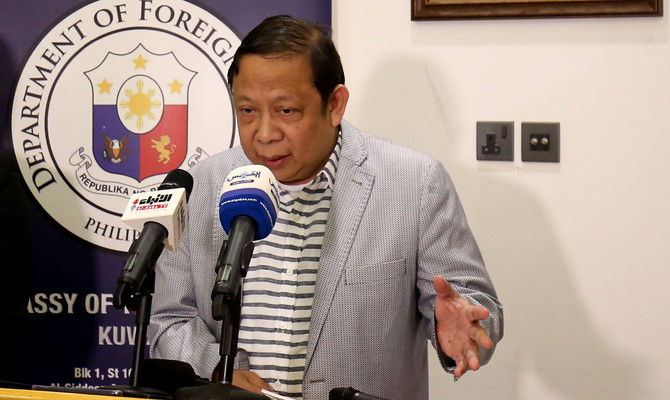MANILA: Kuwait on Wednesday expelled the Philippine ambassador and recalled its own envoy from Manila over a growing diplomatic dispute sparked by complaints of the abuse of Filipino housemaids and workers in the country.
In a statement, Kuwait’s Foreign Ministry said it had declared Ambassador Renato Villa, who it previously summoned twice, persona non grata and had ordered him to leave Kuwait within a week.
The latest move followed Kuwait’s arrest of two Philippine Embassy personnel in Kuwait City last weekend for allegedly encouraging maids to flee their employers’ homes if they are being abused.
Kuwait’s Foreign Ministry accused the Philippines’ mission of a “flagrant and grave breach of rules and regulations that govern diplomatic action where staff helped Filipino house helpers run away.”
Local media earlier quoted Villa as saying his embassy moves in to help abused maids if Kuwaiti authorities fail to respond within 24 hours. Online video later surfaced purportedly showing a Filipino from the embassy helping one maid flee.
The Philippines called Kuwait’s decision “deeply disturbing,” saying it “reneged” on an earlier agreement to work together.
Manila said the expulsion of Villa comes as a surprise considering that Philippine Foreign Secretary Alan Peter Cayetano had issued a formal apology to Kuwait and that Philippine President Rodrigo Duterte had also offered a public apology during a meeting with Kuwaiti Ambassador Musaed Saleh Ahmad Althwaikh in Manila.
“In discussions at every level with Kuwait, the Philippines has always emphasized that the wellbeing of Filipino nationals wherever they may be will always be of paramount importance,” the Philippine Department of Foreign Affairs said in a statement on Wednesday.
“The protection of the rights and the promotion of the welfare of Filipinos abroad would always be the guiding principle of the Philippines in its relationship with countries around the world, including Kuwait,” it added.
The two nations had been negotiating an end to the Philippines’ ban on workers from heading there following the shocking discovery in February of a Filipino maid Joanna Demafelis stuffed into a freezer in Kuwait City for over a year.
In late March, Lebanese officials said 40-year-old Lebanese national Nader Essam Assaf confessed to killing the woman along with his Syrian wife, who remains at large. Both were sentenced in absentia to death by a Kuwait court early this month, though the verdict can be appealed.
But the arrest of two Filipinos associated with the embassy earlier this week over allegedly convincing maids to flee their employers’ homes and Ambassador Villa’s comments reported in local media over the effort appears to have been too much for Kuwait to accept.
“Expelling the ambassador of the Philippines is a correct measure that should have been taken when the Philippines president first started his threats,” conservative Kuwaiti lawmaker Shuaib Al-Muwaizri wrote on Twitter. “The Ministry of Foreign Affairs should not accept any offers made by the Philippines president or his foreign affairs secretary.”
Since becoming president, the populist Duterte has repeatedly criticized Kuwait for not properly addressing the abuse of Filipinos.
“I do not want a quarrel with Kuwait. I respect their leaders but they have to do something about this because many Filipinos will commit suicide,” he said in January.
There have been prominent cases of abuse of Filipino domestic workers in the past, including an incident in December 2014 where a Kuwaiti’s pet lions fatally mauled a Filipino maid.
More than 260,000 Filipinos work in Kuwait, many of them as housemaids. Kuwait and the Philippines have since been negotiating for new rules governing Filipino workers there.
Philippine officials have demanded that housemaids be allowed to hold their passports and cellphones, which is normal for skilled workers like teachers and office workers. But many Kuwaiti employers seize their phones and passports.
The Philippines is a major labor exporter across the world, especially in the Mideast, with about a tenth of more than 100 million Filipinos working abroad. The earnings they send home have bolstered the Philippine economy for decades.
Filipino migrant and recruitment expert Emmanuel Geslani urged Philippine officials to go out of their way to properly address the "diplomatic faux pax", warning that the Philippines had lost the job market in Kuwait, especially for skilled workers.
In an interview, Geslani told Arab News that the ban has now been running for five months, resulting in more than 50,000 Filipinos losing the jobs they applied for in Kuwait.
“We should really issue an apology because we still want to achieve good relations with Kuwait,” said he said. "The government is apologizing for something which was not wrong on its part, but the way it was projected on social media was wrong.
He said the video of embassy personnel rescuing a maid should not have been posted on Facebook. "Even though what the (embassy) staff is doing (rescuing abused workers) is right, they did not have to tell the world that they’re doing it,” Geslani said.
He added that while everybody wants to have good relations, “the Philippine government is doing it all wrong by allowing the deployment ban to last more than five months.”
Kuwaiti Foreign Minister Sheikh Sabah Khaled Al-Sabah earlier also condemned the ban saying it “will not serve the relationship” between the two countries.
It’s likely both sides want to negotiate an end to the dispute, especially ahead of the Muslim holy fasting month of Ramadan that begins in May. Kuwaitis particularly rely on Filipino maids and cooks during the period as they abstain from water and food during daylight hours.
“This is a clash of two rising nationalisms: the tough-guy Philippine president defending his people abroad and Kuwait resenting the insolence of a subordinate,” said Kristin Diwan, an expert on Kuwait and a senior resident scholar at the Arab Gulf States Institute in Washington.
“The expulsion of the ambassador is a hardball tactic on the part of Kuwait, which hopefully will lead to a negotiated settlement. Both countries ultimately benefit from this relationship.”



























